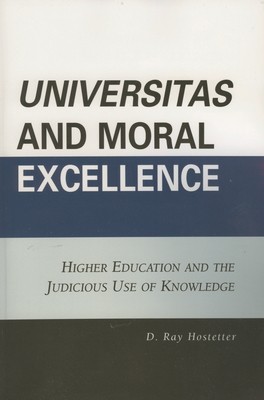
- We will send in 10–14 business days.
- Author: Ray D Hostetter
- Publisher: University Press of America
- ISBN-10: 0761836594
- ISBN-13: 9780761836599
- Format: 16.1 x 22.8 x 2.1 cm, softcover
- Language: English
- SAVE -10% with code: EXTRA
Reviews
Description
This work was born out of a concern that the advancement of society's underlying moral strength is becoming increasingly weaker. Due to this deficiency, there is a call to educators, particularly at the college and university levels, to give careful and collective attention to the three groundings that are consonant with well-functioning societies-morality, rationality, and personal responsibility. The book discusses the universitas model (the historic function of an advanced academic community) as a reference for dialogue and reasoning in the pursuit of moral excellence. Dr. Hostetter articulates that higher educational institutions should seek to understand and restore this model with the ultimate aim of formulating a meaningful institutional worldview. Denoting 'entirety' and signifying 'all together, ' universitas requires that a high measure of solidarity should be demonstrated. The work outlines potential steps and essential aspects of the universitas idea that institutions might consider useful. An overarching goal of universitas is examined under the rubric, 'the judicious use of knowledge.' This implies the necessity that collective stands regarding key values be taken. A basic premise is that colleges and universities should devote mindful attention to discerning 'the highest good' as well as the 'supportive goods' that are required to achieve 'the highest good' for all. Examples of possible institutionally discerned 'goods' are reviewed in several chapters according to religious, ideological, and institutionally unique categories.
EXTRA 10 % discount with code: EXTRA
The promotion ends in 11d.11:45:24
The discount code is valid when purchasing from 10 €. Discounts do not stack.
- Author: Ray D Hostetter
- Publisher: University Press of America
- ISBN-10: 0761836594
- ISBN-13: 9780761836599
- Format: 16.1 x 22.8 x 2.1 cm, softcover
- Language: English English
This work was born out of a concern that the advancement of society's underlying moral strength is becoming increasingly weaker. Due to this deficiency, there is a call to educators, particularly at the college and university levels, to give careful and collective attention to the three groundings that are consonant with well-functioning societies-morality, rationality, and personal responsibility. The book discusses the universitas model (the historic function of an advanced academic community) as a reference for dialogue and reasoning in the pursuit of moral excellence. Dr. Hostetter articulates that higher educational institutions should seek to understand and restore this model with the ultimate aim of formulating a meaningful institutional worldview. Denoting 'entirety' and signifying 'all together, ' universitas requires that a high measure of solidarity should be demonstrated. The work outlines potential steps and essential aspects of the universitas idea that institutions might consider useful. An overarching goal of universitas is examined under the rubric, 'the judicious use of knowledge.' This implies the necessity that collective stands regarding key values be taken. A basic premise is that colleges and universities should devote mindful attention to discerning 'the highest good' as well as the 'supportive goods' that are required to achieve 'the highest good' for all. Examples of possible institutionally discerned 'goods' are reviewed in several chapters according to religious, ideological, and institutionally unique categories.


Reviews